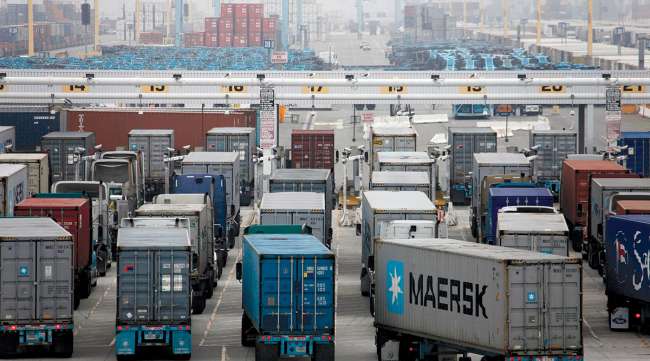Senior Reporter
Two Federal Studies Say Trade War With China Is Damaging US Economy

[Stay on top of transportation news: Get TTNews in your inbox.]
Even as the Trump administration is set to sign phase one of the trade agreement with China, consumers and American businesses continue to feel the impact of the U.S.-China trade war.
“U.S. tariffs continue to be almost entirely borne by U.S. firms and consumers,” Mary Amiti, an economist at the Federal Reserve Bank of New York, said in a National Bureau of Economic Research working paper. The other authors of the paper were David Weinstein of Columbia University and Stephen Redding of Princeton. “We estimate the likely impact on U.S. consumers and find that by the end of 2018, import tariffs were costing U.S. consumers and the firms that import foreign goods an additional $3 billion per month in added tax costs and another $1.4 billion per month in deadweight welfare (efficiency) losses.”
The report analyzed the data on tariffs through October of last year, and the authors found approximately 100% of import taxes fell on American buyers.
The president said Dec. 31 the new trade accord will be signed Jan. 15 in Washington. While China says it will increase its importation of U.S. agriculture products and other items, an estimated $360 billion in tariffs on Chinese goods is expected to remain in place as the nations negotiate a more substantial, long-term agreement.
The tariffs have caused a slowdown in the manufacturing sector, and American Trucking Associations Chief Economist Bob Costello and others have called what’s taking place in that sector a “manufacturing recession.”
Officials with several ports on the Pacific Coast say the tariffs are directly responsible for the slowdown in the number of import and export containers arriving and departing from their facilities to China.

Seroka
Eugene Seroka, executive director of the Port of Los Angeles, the nation’s busiest facility, has been highly critical of the tariffs. He points to a study his port assisted in putting together that showed as many as 1.5 million U.S. jobs, and nearly $190 billion in economic activity, is threatened by tariffs.
“Some regions and industries are already feeling the pain, and the damage to jobs, income and tax revenue could be crippling down the road,” Seroka said.
This is the second report in less than a month that has taken a critical look at tariffs and the impact they are having on the U.S. economy.
A study published Dec. 23 by Federal Reserve Board economists Aaron Flaaen and Justin Pierce also was critical of the trade war. It found that any positive effects the tariffs offered American businesses, their costs outweighed the damage done to businesses. This report looked specifically at the impact tariffs were having on the U.S. manufacturing sector.
“We find that tariff increases enacted in 2018 are associated with relative reductions in manufacturing employment and relative increases in producer prices,” the report said. Manufacturing employment was reduced by 1.4%, and producer prices have increased by 4.1%.
When the tariffs were imposed, the Trump administration said they would bring manufacturing jobs back to the U.S., but the report said the opposite had taken place. “Our results indicate that tariffs have been a drag on employment and have failed to increase output.”
Rajeev Dhawan is director of the Economic Forecasting Center at Georgia State University in Atlanta. He told Transport Topics he is concerned that higher fuel prices could damage the U.S. economy, especially as tensions between the U.S. and Iran increase.

Dhawan
“There is always a drama going on in the Middle East; that’s a given for the past 500 years,” Dhawan said. “But if it shows up in the price of gasoline or diesel at the pump, for the consumer, for the transporter, for the manufacturer, for UPS, FedEx, all these transportation companies, it’s bad news. Geopolitical tension was one of my random cards for a problem in 2020.”
Dhawan says if oil prices rise, and stay at a higher level for weeks, he would downgrade his forecast for the nation’s first-quarter gross domestic product in 2020 from 1.5% growth to 1%.
“The probability that we will achieve that 1.5, 1.6% growth are much lower now,” he said.
Oil industry analyst Tom Kloza with the Oil Price Information Service told TT he is cautiously optimistic that even with the escalation of tensions with Iran, he doesn’t expect gasoline and diesel prices to excessively increase.
“I think we learned with the Saudi [oil field] attacks in September, the market will overprice things. But they’re not going to run willy nilly to the sky like it used to,” Kloza said.
The primary reason why Kloza believes prices will remain stable is the development of the West Texas oil fields and other areas that are expected to push domestic crude production to 13.2 million barrels per day, according to the U.S. Energy Information Agency. That’s an increase of more than 5 million barrels a day, in just five years.
Want more news? Listen to today's daily briefing:




